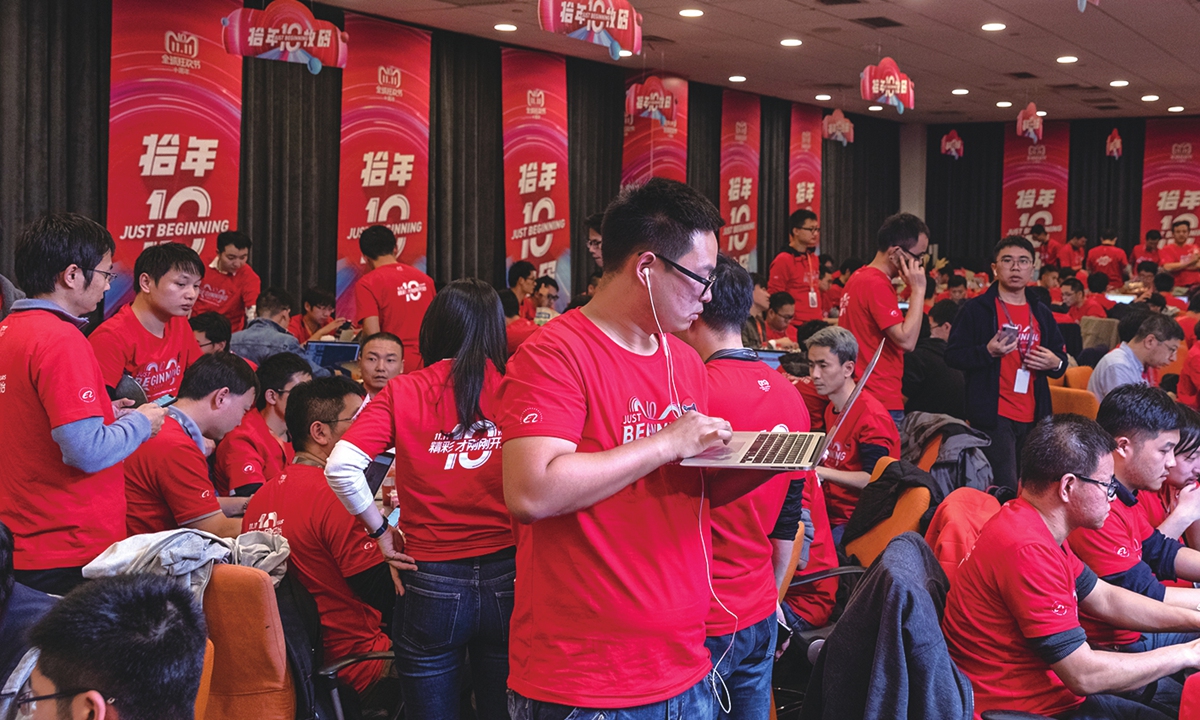Chinese internet firms bow to public pressure, easing work length
Compulsory overtime weekend is out

A view of ByteDance's stand at the Digital China Summit 2021 Photo: cnsphoto
A flurry of internet firms providing services ranging from search, e-commerce to mobile games were born in China since 1994. Ever since their birth, the interest-based companies have sustained an incredibly fast growth, driven by the doctrine that "it is not the big fish that eats the small fish, but it's the fast fish that eats the slow fish."
Having built strong moats against intense competition, internet giants now decide to slow down their pace a little bit to ease the grueling overtime hours amid mounting public complaints, and avoid becoming "big but evil companies."
TikTok owner ByteDance announced on July 9 that it would end compulsory weekend overtime policy from August 1, about two weeks after short-video rival Kuaishou made a similar decision.
In a widely circulated internal memo, ByteDance told its staff that it will cancel the overtime rule of a "big week" with two days off and a "small week" with only one day off. Employees that need to work over the weekend should submit requests via an internal operational system.
The internet giants' move triggered mixed reactions among tech employees, with many hail a balanced work and life while some are worried about a potential decrease in income.
"About one-third of the employees surveyed within our company are in favor of the policy change, one-third against the decision and the rest show no preference," a 31-year-old Shanghai-based ByteDance engineer surnamed Gao told the Global Times.
He said that he feels this is a good thing for him. "Last year, my wife gave birth to a new baby, who now stays with my wife in Nanjing [capital city of East China's Jiangsu Province], about two-hour high-speed train travel to Shanghai. Without weekend overtime, I can return home and accompany my family members every week," he said, noting that the cost is that he has forgone 100,000 yuan ($15,430) a year in salary.
Gao said that he been accustomed to the "996" work style, as his former employer Tencent and other large internet firms have adopted the same working timeline to compete with each other. "Although the compulsory weekend overtime work policy is now eliminated, overtime on working days will not disappear in the next few years."

Alibaba staff work hard on the eve of Double 11 shopping festival in its headquarters in Hangzhou, East China's Zhejiang Province in 2018. Photo: cnsphoto
"996" cultureThe "996" work timeline - a reference to working from 9 am to 9 pm, six days a week - emerged along with the breakneck heated development of the internet sector in the last two decades. Technology workers and analysts said that the competition in China's internet sector is "brutal" while the opportunities are too broad to take a laid-back approach.
In June 2019, Kuaishou founders Su Hua and Cheng Yixiao expressed anxiety over the startup's growth pace in an internal letter to its employees, domestic news outlet Jiemian News reported.
"We are no longer the fastest team. In the process of our business expansion, our actions and response become slower and slower. Our connection with the end users is weakening. We are not satisfied with the status quo, the loose organization, the 'Zen' attitude, becoming a 'slow company', and this is all very worrisome," read the letter.
Internet companies' relentless pursuit of larger market share weighs on employees and thereafter, long working hours were introduced in the sector. Although technology workers constantly grumble about overtime, the problem didn't cause condemnation until the death of a 23-year-old Pinduoduo employee in December 2020.
During this year's two sessions, some members of the Chinese People's Political Consultative Conference (CPPCC) called for tighter regulation on "996" overtime work so as to increase the quality of life for workers in the massive industry.
"The overtime policy is obviously not in line with the law, because the Labor Law stipulates that normally, overtime should not exceed one hour per day, and no longer than three hours per day under special circumstances, and the total monthly overtime should not exceed 36 hours," Zhao Zhanling, a legal counsel at the Beijing-based Internet Society of China, told the Global Times.
A Beijing-based internet worker told the Global Times that he felt a great relief with the elimination of the "996" work timeline. "There is too much pressure at work. My heart is sometimes uncomfortable and my hands often shake… My hope is to enjoy two-day weekend, like others."
Retaining talent
"Removing weekend overtime work will be a trend in China's internet sector," Lu Zhenwang, founder of Shanghai Wanqing Commerce Consulting, told the Global Times.
As the competition structure in China's internet industry has largely formed and their business growth has entered a steady period given the country's stepped-up measures against anti-monopoly, large internet platforms feel less pressure than they used to, Lu said, noting that innovation also requires enough brain rest.
He said the foremost task for leading Chinese internet companies is to retain talent and recover their reputation as a responsible and caring enterprise.
Recently, JD.com announced that it will gradually raise employees' yearly income to the equivalent of 16-month wages by July 2023 from current level of 14 months, or a 14 percent increase on average.
In addition, Xiaomi said on July 7 that it has offered 21 million yuan in company shares to a total of 122 workers including technology specialists and employees in leading management positions. "Talent will be the cornerstone of Xiaomi's fast development over the next 10 years," Xiaomi Founder Lei Jun posted on Sina Weibo after the announcement.
"The encouragement may not cover massive workers at grass-roots, but daily overtime will undoubtedly persist," Gao said, noting that the internet industry will reach its peak when there is no more overtime.



